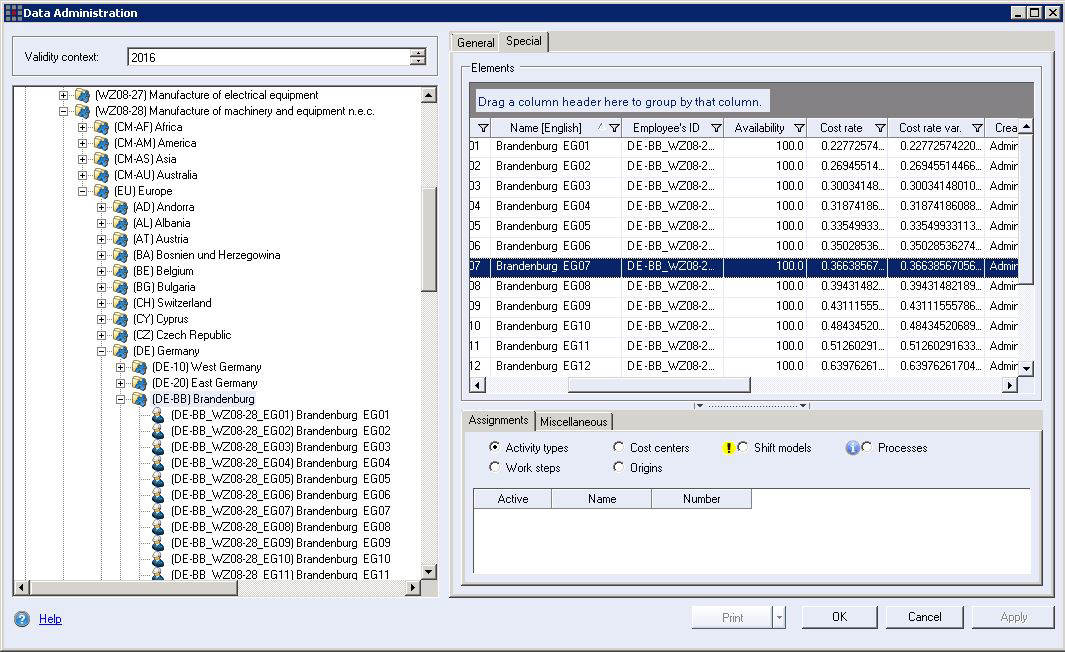Employees category
The FACTON® Content employees category contains labor data for 18 industries and over 2,000 countries and regions in 15 qualification levels each. These qualification levels are based on the compensation framework agreement (ERA) system. To make it easier to compare them in Germany and around the world, they are defined as follows:
Table: Definition of qualification levels
| Pay scale | Description |
|---|---|
| EG01 (Unskilled employee/inexperienced) | Simple work that can be performed without previous job knowledge following a short training period and brief instruction. |
| EG02 (Unskilled employee/experienced) | Work that requires job knowledge and skills with a certain amount of experience and a training period of at least 4 weeks. |
| EG03 (Skilled employee/inexperienced) | Work that requires technical knowledge and job knowledge and skills with additional experience that go beyond the requirements of the previous labor groups. |
| EG04 (Skilled employee/experienced) | Work that requires comprehensive technical and job knowledge and skills that are attained through completed education in a recognized semi-skilled occupation or an equivalent managerial education and corresponding experience. |
| EG05 (Completed education/inexperienced) | Specialized work that requires specialized skills that are attained through properly completed education geared towards the respective specialty, or work whose performance requires equivalent specialized skills and specialized knowledge. |
| EG06 (Completed education/experienced) | Difficult work that requires special skills and many years of experience. |
| EG07 (Additional specialist training of at least 1 year/inexperienced) | Employee who, after receiving detailed instruction, can independently perform tasks that require knowledge and skills that are generally learned through an education program or a technical or commercial career. |
| EG08 (Additional specialist training of at least 1 year/experienced) | Employee who, after receiving instruction, can perform defined tasks that require solid technical knowledge and job skills. Tasks that require a high degree of technical knowledge and experience. |
| EG09 (Additional specialist training of at least 2 years/inexperienced) | Training equivalent to that of foreman with coordination and supervisory authority and with technical responsibility for a group of employees or auxiliary activity for the department foreman. |
| EG10 (Additional specialist training of at least 2 years/experienced) | Training equivalent to that of foreman with coordination and supervisory authority and with technical responsibility for a mid-size to large shop or a corresponding department. |
| EG11 (Completed education at a university of applied science) | Employee who can perform his/her work independently and responsibly and whose work requires multifaceted technical knowledge – including in adjacent work areas – and/or long-term, comprehensive professional experience. |
| EG12 (Completed education at a university) | Responsible, demanding tasks within the framework of general guidelines without special management responsibility. Requires knowledge and skills that are generally obtained through a completed course of study. |
| EG13 (Manager/inexperienced) | Responsible, demanding tasks within the framework of general guidelines as a group or department head with management responsibility. Requires knowledge and skills that are generally obtained through a completed course of study. |
| EG14 (Manager/experienced) | Complex managerial task areas as a department head or area head (authorized representative) with serious decision-making authority. Requires knowledge and skills that are generally obtained through a completed course of study. |
| EG15 (Executive manager) | Executive managerial tasks within a company or managerial factory manager of a manufacturing facility. |
The labor data listed here is the product of the computed net hourly labor rate and a social overhead cost factor. This social overhead cost factor is listed separately in the description field and includes the following additional personnel costs:
- Retirement, health, nursing care, unemployment insurance
- Professional associations
- Company pensions
- Voluntary social benefits
- Vacation pay and holiday bonuses
- Capital-forming benefits
- Account management charges
- Further training
- Holidays and vacation days
- Sick days
- Staff meetings
Additional personnel costs are average values for the corresponding industry and qualification level in the respective locations. Not every country uses all of the social benefits listed here. Consequently, the social overhead cost factors are subject to fluctuations. The net hourly labor rate offers a direct basis for comparison.

Figure: Administration - FACTON® Content - Employee category